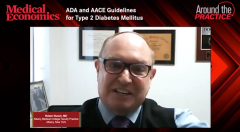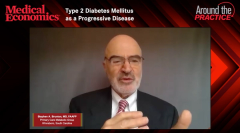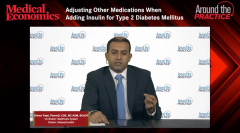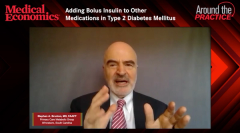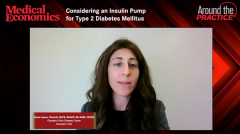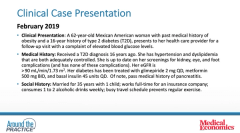
Adjusting other medications when adding insulin for Type 2 Diabetes Mellitus
Episodes in this series

Dhiren Patel, PharmD, CDE, BC-ADM, BCACP: When we think about the newer guidelines [American Diabetes Association Standards of Medical Care in Diabetes], some of the comments that were made earlier regarded starting certain medications without it being looked through the glycemic lens. We now have the guidelines, and they’re saying to start medications independent of the patient’s A1C [glycated hemoglobin]. What considerations are you making when you’re starting insulin therapy, whether it’s decreasing the dose of an existing medication if you’re thinking about adding a GLP along with it. Because as you all know, we have both basal insulin and GLP combinations. I’d love to hear about what is going through your mind in terms of tweaking other medications. Are there any adjustments that you’re taking into account?
Stephen A. Brunton, MD, FAAFP: Hypoglycemia is an important consideration. We forgot to mention it, but when we start a patient on insulin, we should also be giving a prescription for glucagon as well. Glucagon is vastly underprescribed. And if the patient has symptomatic, severe hypoglycemia, then that will change the whole situation and their perception of insulin. Having that 15 g of carbohydrates and checking in 15 minutes is the best way to go for most hypoglycemia, but if you have severe hypoglycemia, that would scare everybody.
With that being said, sulfonylureas are probably 1 of the largest causes of hypoglycemia that the patients have. Depending on what their starting A1C is, I’ll normally decrease that by at least 50% to make sure they are less likely to have hypoglycemia.
In terms of the other agents, I’m most worried about SGLT2s or GLP1s because those are glucose-dependent mechanisms. I’ll monitor it, and as Diana pointed out before, we have much greater access to CGM [continuous glucose monitoring], so flash glucose monitoring is accessible by prescription, and you can have it and do a 2-week trial of that so people can see where they’re going. My major focus now is on sulfonylureas.
Dhiren Patel, PharmD, CDE, BC-ADM, BCACP: Any other considerations other folks are making?
Diana Isaacs, PharmD, BCPS, BCACP, BC-ADM, CDCES: Yes, I totally agree. I usually want to optimize the other noninsulin therapies like the GLP1s and SGLT2 inhibitors. I’m not going to decrease those; rather, I’m going to add insulin cautiously to make sure we don’t cause hypoglycemia. I agree that we have to worry about sulfonylureas and about anyone using the meglitinides, which can also cause hypoglycemia.
Robert Busch, MD: I liked when Stephen talked about it. I asked him, “You drove here today? Do you have juice in the car? Do you have glucose tablets? Do you have chocolate candy? What do you have with you if you went low?” If they say, “I always carry something,” then I say, “Really? Show me: What do you have with you in your pocket now? What did you have in the car when you drove here? Does your relative know how to give glucagon?” There are a lot of ways to give glucagon, so teaching the relatives how to give it is important as well as they’re the ones who give it.
Dhiren Patel, PharmD, CDE, BC-ADM, BCACP: Hypoglycemia is a big thing, so I agree with you, Steve. We need to spend more time making sure they know what to do in those emergency situations. We’re already concerned about the hypoglycemia risk with basal insulin. We know that some of our patients—as much as we want them to be on a GLP and an SGLT2 inhibitor—are going to have some issues, contraindications or precautions that are known to exclude the use of those drugs. Many of our patients will still end up on a basal bolus insulin regimen.
Newsletter
Stay informed and empowered with Medical Economics enewsletter, delivering expert insights, financial strategies, practice management tips and technology trends — tailored for today’s physicians.


